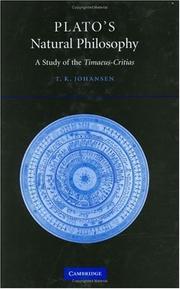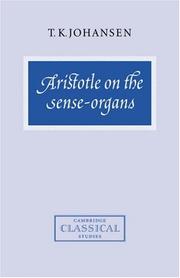| Listing 1 - 4 of 4 |
Sort by
|

ISBN: 0521790670 9781107321342 1107321344 9780511839610 0511839618 9780521790673 9780521067485 1139809644 9781139809641 1107315956 9781107315952 1107316901 9781107316904 1107317886 9781107317888 1299399185 9781299399181 1107314976 9781107314979 0511518471 9780511518478 0521067480 Year: 2004 Publisher: Cambridge New York Cambridge University Press
Abstract | Keywords | Export | Availability | Bookmark
 Loading...
Loading...Choose an application
- Reference Manager
- EndNote
- RefWorks (Direct export to RefWorks)
Plato's dialogue the Timaeus-Critias presents two connected accounts, that of the story of Atlantis and its defeat by ancient Athens and that of the creation of the cosmos by a divine craftsman. This book offers a unified reading of the dialogue. It tackles a wide range of interpretative and philosophical issues. Topics discussed include the function of the famous Atlantis story, the notion of cosmology as 'myth' and as 'likely', and the role of God in Platonic cosmology. Other areas commented upon are Plato's concepts of 'necessity' and 'teleology', the nature of the 'receptacle', the relationship between the soul and the body, the use of perception in cosmology, and the work's peculiar monologue form. The unifying theme is teleology: Plato's attempt to show the cosmos to be organised for the good. A central lesson which emerges is that the Timaeus is closer to Aristotle's physics than previously thought.
Philosophy, Ancient --- Cosmology, Ancient --- Teleology --- Necessity (Philosophy) --- Philosophie ancienne --- Cosmologie antique --- Téléologie --- Nécessité (Philosophie) --- History --- Histoire --- Plato. --- Cosmology --- Early works to 1800. --- Cosmology. --- Teleology. --- Téléologie --- Nécessité (Philosophie) --- Design in natural phenomena, Study of --- Final cause --- Philosophy --- Causation --- Evolution --- Astronomy --- Deism --- Metaphysics --- Criticism and interpretation. --- Arts and Humanities --- Cosmology - Early works to 1800. --- Teleology - Early works to 1800.

ISBN: 0521583381 0521714737 0511518463 0511835981 9780521583381 9780511518461 9780521714730 Year: 1997 Publisher: Cambridge Cambridge University Press
Abstract | Keywords | Export | Availability | Bookmark
 Loading...
Loading...Choose an application
- Reference Manager
- EndNote
- RefWorks (Direct export to RefWorks)
This book offers an important study of Aristotle's theory of the sense-organs. It aims to answer two questions central to Aristotle's psychology and biology: why does Aristotle think we have sense-organs, and why does he describe the sense-organs in the way he does? The author looks at all the Aristotelian evidence for the five senses and shows how pervasively Aristotle's accounts of the sense-organs are motivated by his interest in form and function. The book also engages with the celebrated problem of whether perception for Aristotle requires material changes in the perceiver. It argues that, surprisingly to the modern philosopher, nothing in Aristotle's description of the sense-organs requires us to believe in such changes.
Sense organs --- Organes des sens --- Senses and sensation --- Perception (Philosophy) --- Sense (Philosophy) --- Sens et sensations --- Perception (Philosophie) --- Sensibilité (Philosophie) --- History --- Philosophy --- Histoire --- Philosophie --- Aristotle --- Criticism and interpretation. --- Critique et interprétation --- Arts and Humanities --- History. --- Aristotle. --- Aristoteles --- Aristote --- Arisṭāṭṭil --- Aristo, --- Aristotel --- Aristotele --- Aristóteles, --- Aristòtil --- Aristotile --- Arisṭū --- Arisṭūṭālīs --- Arisutoteresu --- Arystoteles --- Ya-li-shih-to-te --- Ya-li-ssu-to-te --- Yalishiduode --- Yalisiduode --- Ἀριστοτέλης --- Αριστοτέλης --- Аристотел --- ארסטו --- אריםטו --- אריסטו --- אריסטוטלס --- אריסטוטלוס --- אריסטוטליס --- أرسطاطاليس --- أرسططاليس --- أرسطو --- أرسطوطالس --- أرسطوطاليس --- ابن رشد --- اريسطو --- Pseudo Aristotele --- Pseudo-Aristotle --- アリストテレス
Multi
ISBN: 9781108485845 9781108725279 9781108641579 1108725279 1108485847 1108624154 1108624561 1108641571 Year: 2021 Publisher: Cambridge Cambridge University Press
Abstract | Keywords | Export | Availability | Bookmark
 Loading...
Loading...Choose an application
- Reference Manager
- EndNote
- RefWorks (Direct export to RefWorks)
"This work investigates how ancient philosophers understood productive knowledge or technê and used it to explain ethics, rhetoric, politics and cosmology. In eleven chapters leading scholars set out the ancient debates about technê from the Presocratic and Hippocratic writers, through Plato and Aristotle and the Hellenistic age (Stoics, Epicureans and Sceptics), ending in the Neoplatonism of Plotinus and Proclus. Amongst the many themes that come into focus are: the model status of ancient medicine in defining the political art, the similarities between the Platonic and Aristotelian conceptions of technê, the use of technê as a paradigm for virtue and practical rationality, technê's determining role in Platonic conceptions of cosmology, technê's relationship to experience and theoretical knowledge, virtue as an 'art of living', the adaptability of the criteria of technê to suit different skills, including philosophy itself, the use in productive knowledge of models, deliberation, conjecture and imagination"--
Philosophy, Ancient --- Techne (Philosophy) --- Theory of knowledge --- History of philosophy --- Philosophy, Ancient. --- Technology --- Philosophy.
Book
ISBN: 9780198908678 Year: 2024 Publisher: Oxford Oxford university press
Abstract | Keywords | Export | Availability | Bookmark
 Loading...
Loading...Choose an application
- Reference Manager
- EndNote
- RefWorks (Direct export to RefWorks)
| Listing 1 - 4 of 4 |
Sort by
|

 Search
Search Feedback
Feedback About UniCat
About UniCat  Help
Help News
News